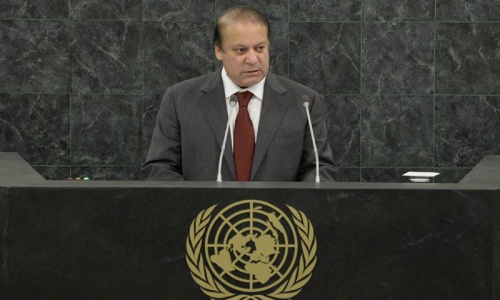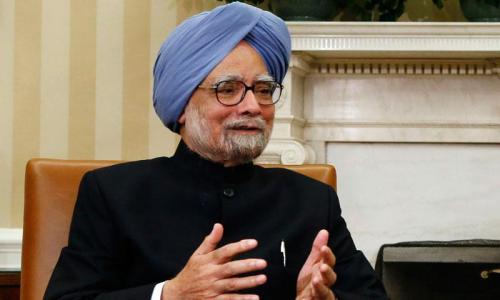UNITED NATIONS: Indian Prime Minister Manmohan Singh warned Saturday that Pakistan must stop being “the epicenter of terrorism” if it wants better ties ahead of his first meeting with Nawaz Sharif.
Singh will sit down for breakfast Sunday on the sidelines of the United Nations summit with Sharif, Pakistan's newly elected premier, who appealed Friday for a “new beginning” with the historic rival.
Addressing the UN General Assembly, Singh said he shared Sharif's hopes for better relations but warned that Pakistan must no longer be “the epicenter of terrorism in our region” in the wake of another deadly attack in Indian-administered Kashmir.
“For progress to be made, it is imperative that the territory of Pakistan and the areas under its control are not utilised for aiding or abetting terrorism,” Singh said.
“It is equally important that the terrorist machinery that draws its sustenance from Pakistan be shut down,” he said.
Singh said he supported resolving questions over Kashmir – which is divided between the South Asian powers and is claimed by both – but stood firm that the Himalayan territory is “an integral part of India.”
“There can never, ever, be a compromise with the unity and territorial integrity of India,” he said.
The Singh-Sharif meeting on Sunday is considered as a fresh chance for one leader to push for peace on the subcontinent – and likely the last chance for the other.
It is their first face-to-face since Sharif's election victory in May. Singh will step down next year.
Sharif calls the meeting a chance for a “new beginning” and Singh on Saturday told the General Assembly that “I reciprocate his sentiments.”
But Singh has tamped down expectations for the talks, which take place amid an upsurge in militant attacks in disputed Kashmir. Speaking Friday after a White House meeting with President Barack Obama, Singh said, “the epicenter of terror still remains focused in Pakistan.”
In Saturday's speech, Singh said India was committed to resolving all issues with Pakistan, but he again expressed his concerns about terror attacks and repeated his government's view that Kashmir “is an integral part of India.”
The need for peace between the South Asian nuclear rivals has rarely been greater. They have been at odds since Britain granted independence and carved up the subcontinent in 1947, but the impending US military withdrawal from Afghanistan, where India and Pakistan have competing interests, adds new uncertainty to a region increasingly threatened by Islamic militancy.
“It's timely for them to meet,” said Karl Inderfurth, a former top US diplomat for South Asia and now at the Center for Strategic and International Studies think tank in Washington.
“It's Nawaz Sharif's first chance as the new prime minister to reach across to his Indian counterpart and it's maybe Manmohan Singh's last chance to do what he has repeatedly said he wants to do, which is open up a new relationship with Pakistan.”
Both men are familiar with the pitfalls of seeking to improve ties between India and Pakistan – a relationship scarred by three wars and deep mutual suspicion. Sharif was in power when Pakistan first tested a nuclear bomb in 1998. But he also presided over one of the more upbeat episodes in recent relations with India.
He hosted then-Prime Minister Atal Vajpayee for a summit in Lahore in February 1999, where they signed a landmark declaration on avoiding nuclear conflict and opened a cross-border bus service.
Three months later, the impetus for peace was crushed when a Pakistani military quietly infiltrated into an area of Indian-held Kashmir called Kargil, sparking fighting that left hundreds dead on both sides and could have sparked nuclear war. Sharif, who said the army acted without his knowledge, was ousted in a coup five months later. Back in office again, Sharif is particularly keen to increase cross-border trade to jump-start Pakistan's stricken economy.
“Pakistan and India can prosper together, and the entire region would benefit from our cooperation,” Sharif told the General Assembly on Friday.
But Singh has said relations can only improve once Pakistan cracks down on militants accused on staging attacks in India – a perennial concern that has only intensified since the 2008 Mumbai attacks that killed 164 people in India's commercial hub.
A renewed spate of violence along the disputed Kashmir frontier this year has threatened a decade-long cease-fire. On Thursday, suspected separatist rebels killed 10 Indian security forces in the Indian-held portion of the Himalayan region – an attack that the top elected official there said was aimed at derailing the meeting of Sharif and Singh in New York.
Yet with time running out on his nearly decade-long premiership, Singh will be thinking about his legacy.
He was born in the northern Punjab village of Gah in what later became Pakistan, and within a year of taking office invited then-Pakistani leader Pervez Musharraf to a cricket match in India. The two made heartening progress in talks and even pronounced in 2005 that the peace process between India and Pakistan was “irreversible.”
Subsequent events, particularly the Mumbai attacks, changed the tone.
Formidable obstacles remain toward achieving a lasting peace. Despite increasing people-to-people ties and tentative moves to ease barriers to commerce and travel, the security establishments on both sides still regard the other as the enemy. – AP/AFP














































